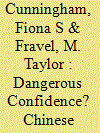|
|
|
Sort Order |
|
|
|
Items / Page
|
|
|
|
|
|
|
| Srl | Item |
| 1 |
ID:
168949


|
|
|
|
|
| Summary/Abstract |
Chinese views of nuclear escalation are key to assessing the potential for nuclear escalation in a crisis or armed conflict between the United States and China, but they have not been examined systematically. A review of original Chinese-language sources and interviews with members of China's strategic community suggest that China is skeptical that nuclear escalation could be controlled once nuclear weapons are used and, thus, leaders would be restrained from pursuing even limited use. These views are reflected in China's nuclear operational doctrine (which outlines plans for retaliatory strikes only and lacks any clear plans for limited nuclear use) and its force structure (which lacks tactical nuclear weapons). The long-standing decoupling of Chinese nuclear and conventional strategy, organizational biases within China's strategic community, and the availability of space, cyber, and conventional missile weapons as alternative sources of strategic leverage best explain Chinese views toward nuclear escalation. China's confidence that a U.S.-China conflict would not escalate to the use of nuclear weapons may hamper its ability to identify nuclear escalation risks in such a scenario. Meanwhile, U.S. scholars and policymakers emphasize the risk of inadvertent escalation in a conflict with China, but they are more confident than their Chinese counterparts that the use of nuclear weapons could remain limited. When combined, these contrasting views could create pressure for a U.S.-China conflict to escalate rapidly into an unlimited nuclear war.
|
|
|
|
|
|
|
|
|
|
|
|
|
|
|
|
| 2 |
ID:
191604


|
|
|
|
|
| Summary/Abstract |
Amid an intensifying rivalry with the United States, China is modernizing and significantly expanding its nuclear forces. These developments fuel concerns that China's traditional nuclear strategy premised on a limited nuclear arsenal for assured retaliation and a no-first-use policy is undergoing a major shift. Using Chinese-language materials, an examination of Chinese debates about China's security environment and the future direction of its nuclear strategy finds that a nuclear-conventional entangled security dilemma is emerging between the United States and China. The shift in the conventional balance of force in the region and the U.S. development of lower-yield nuclear weapons has led to greater fears in China of U.S. limited nuclear use in a conflict. Chinese strategists increasingly believe that U.S. nonnuclear strategic capabilities threaten China's nuclear forces. Although there is limited evidence of a shift in its nuclear strategy, China is changing its strategic posture to ensure its second-strike capability, including by relying on advanced conventional weapons (e.g., counterspace capabilities, cyber weapons, and electronic warfare) that can target U.S. missile defense. The dynamics of an entangled security dilemma may weaken arms race stability, and they underscore why it will be challenging for the United States to engage China in nuclear arms control.
|
|
|
|
|
|
|
|
|
|
|
|
|
|
|
|
| 3 |
ID:
187766


|
|
|
|
|
| Summary/Abstract |
How strenuously, and at what risk, should the United States resist China's efforts to dominate the South China Sea? An identification of three options along a continuum—from increased resistance to China's assertive policies on one end to a partial South China Sea retrenchment on the other, with current U.S. policy in the middle—captures the choices facing the United States. An analysis of China's claims and behavior in the South China Sea and of the threat that China poses to U.S. interests concludes that the United States' best option is to maintain its current level of resistance to China's efforts to dominate the South China Sea. China has been cautious in pursuing its goals, which makes the risks of current policy acceptable. Because U.S. security interests are quite limited, a significantly firmer policy, which would generate an increased risk of a high-intensity war with China, is unwarranted. If future China's actions indicate its determination has significantly increased, the United State should, reluctantly, end its military resistance to Chinese pursuit of peacetime control of the South China Sea and adopt a policy of partial South China Sea retrenchment.
|
|
|
|
|
|
|
|
|
|
|
|
|
|
|
|
| 4 |
ID:
136637


|
|
|
|
|
| Summary/Abstract |
In analyses of China's military modernization, it has become increasingly common to describe China as pursuing a “counter-intervention” strategy in East Asia. Such a strategy aims to push the United States away from China's littoral, forestalling the United States’ ability to intervene in a conflict over Taiwan or in disputes in the East and South China Seas. Moreover, such a military strategy is consistent with a purported broader Chinese goal to displace the United States from its traditional regional role, including Washington's support for global norms such as freedom of navigation in Exclusive Economic Zones (EEZs) and partnerships with long-standing treaty allies.
|
|
|
|
|
|
|
|
|
|
|
|
|
|
|
|
|
|
|
|
|